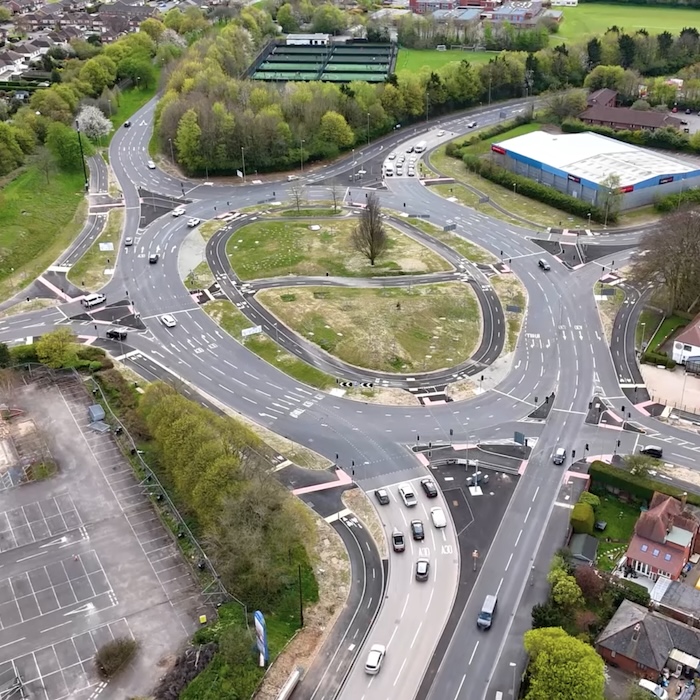
The Brighton Hill Roundabout. (Source:
Auto Shenanigans)
Today I saw a video by a couple of guys who make YouTube videos about roads, accusing Hampshire county council in south-eastern England of spending £20 million on making a bad roundabout even worse. (Not the first time they’ve accused councils of doing this.) The roundabout is the Brighton Hill Roundabout on the A30 in Basingstoke, where it meets the old by-pass (now a local road) and three other local roads, and previously had a network of subways under both it and some of the feeder roads, linked by walkways inside the roundabout. Now, the roundabout has been enlarged, extra lanes added to the roadways, and the subways replaced by at-level pedestrian crossings. The two men opined that the pedestrian crossings make the extra lanes pointless, and point out other defects, some real (such as traffic lights obscuring traffic signs) and some spurious (such as traffic lights being on a roundabout at all). A friend told me that people she knew used the roundabout and did find the new layout confusing, but that this was nothing to do with the removal of the subways which she agreed with.
First, why have traffic lights on a roundabout? The answer is that a priority-only roundabout only works at a junction which isn’t too busy. Where you have multiple busy roads meeting at a roundabout, you end up with one stream of traffic dominating it and traffic from other directions queuing, sometimes for hundreds of yards, because they can’t get in edgeways. The Waggoners’ Roundabout in west London is a classic example: at busy times it can take a long while to get onto the roundabout from the westbound A4 (from Heathrow) because of fast-moving traffic coming round from the A4 from London and the A312 from Feltham. This may have been the situation at the Brighton Hill Roundabout and adding the signals would have ensured everyone could get onto the roundabout; however, it also facilitates the pedestrian crossings.
Second, why slow traffic down? Isn’t the whole point of roads and cars that you can drive fast? The answer is that the council might not want through traffic using local roads; they want them to take the M3 from the nearest place, which for much of Basingstoke is the eastern junction, or junction 6 (this is convenient for the town centre and the large industrial area on the north-eastern side of the town), rather than take the scenic route through the suburbs of Basingstoke. Slower traffic is also safer to cross for both pedestrians and cyclists. There’s a perfectly good motorway a few hundred yards away (which is maintained by central government, not the county council).
However, the biggest issue is why they got rid of those subways. Subways mean pedestrians can walk safely away from the traffic and the drivers can put their foot down because of nobody slowing them down, right? The problem is that subways and segregated walkways are a facet of twentieth-century urban planning that rapidly turned sour as they became favourite hangouts for undesirables of one kind or another; we have seen them removed from council estates where they used to link housing blocks, and from many other busy junctions. People, especially women, just don’t feel safe walking through them and a network of subways and walkways through a roundabout will, at less busy times and especially at night, be secluded; they will feel much safer using an at-level crossing where they can be easily seen and so can everyone else using it. Without them, they will be forced to take detours or just risk crossing the road, and many women would rather risk being run over than being raped. As a female acquaintance told me when I mentioned this on Twitter, “subways are a big no-no especially for lone women”. Yes, we all know that most rapes are acquaintance rapes, but every so often there’s an exception (here in the south-east we all remember Antoni Imiela, surely) and if you’re a man, you wouldn’t want your wife or sister to be the first to find out.
So, just because a junction upgrade or alteration means that drivers can’t speed through it as fast as they used to be able to, it doesn’t mean it’s bad or that it’s a waste of money. No doubt the council decided that it was more important that people be able to walk or cycle from one bit of their own town to the next safely than that motorists be able to speed across a suburban area without more than dabbing the brake pedal when they could well use the perfectly good motorway, or just slow down a little bit. In many towns in the UK, as in Europe, urban spaces are being redesigned so that pedestrian safety comes before driver speed and that roads aren’t the impenetrable barriers between neighbourhoods that they often have been since the 1960s. As frustrating as it may be for some motorists, an upgrade that makes pedestrians’ and cyclists’ journeys safer is money well spent.
Possibly Related Posts:

 The Brighton Hill Roundabout. (Source:
The Brighton Hill Roundabout. (Source: